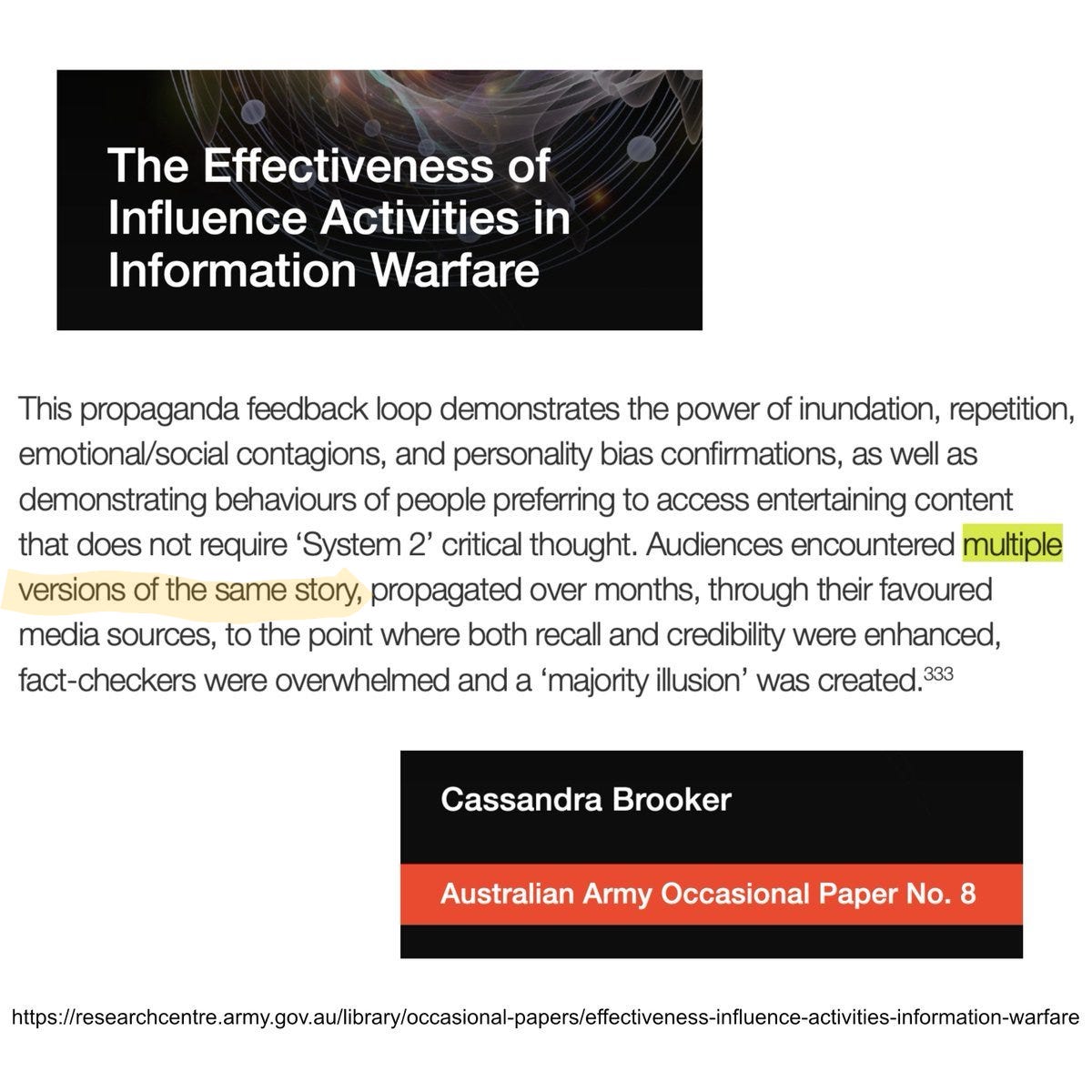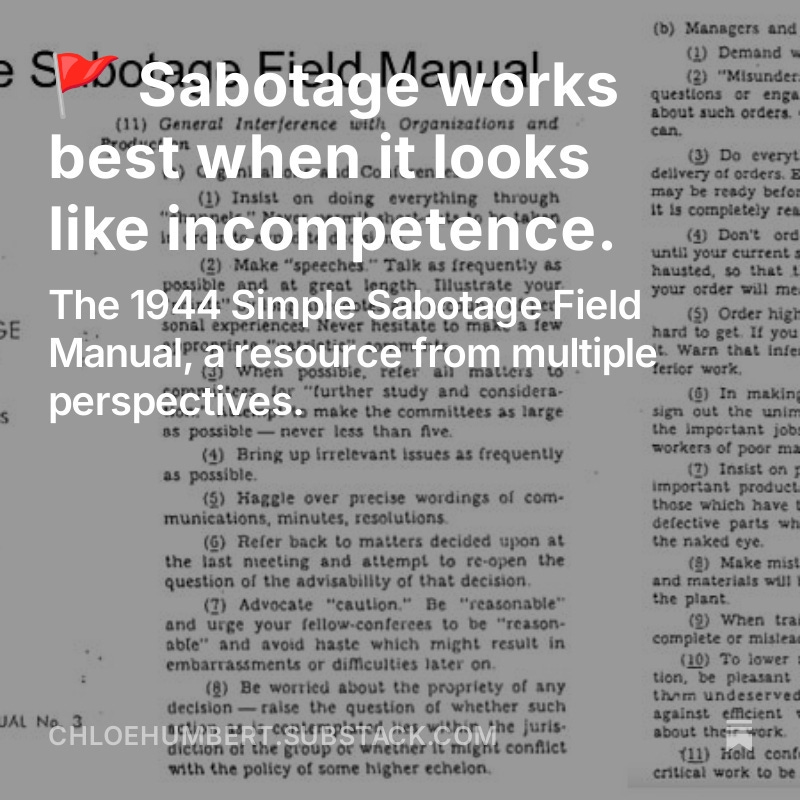It’s a known thing - that people have to hear information from multiple sources in conjunction with even just weak personal connections1 in order for basic true information to be taken in and take hold. This is why marketing strategies involve multiple types of PR in the media, including op-eds, letters to the editor, advertisements and commercials, billboards, and social media via brands and influencers. Often operators resort to online social media sock puppets which have been cultivated to have a following,2 or even just botnets to give the appearance of popularity.3 It's not about reaching more people, it's about reaching people from multiple directions, repeatedly,4 and then those people spread it further in a feedback loop5 - maybe by creating a community around a brand,6 product, or ideology.
So it’s ok to absolve oneself for a failure to reach some family members and friends with good information. It’s hard to go up alone against the volume of misinformation people are often steeped within. It also means some level of coordination with others is necessary if you want to make a difference. And it means that consolidation in organizing is not only unnecessary, but maybe even not necessarily as effective as communicating, independent actors, or small groups working separately. Op-eds, letters to the editor, journal articles, and public comments at public meetings are independent acts of political engagement, and you may have already noticed that your opposition is sure using these levers.
It’s important not to unwittingly or accidentally amplify the opposition’s messaging and be a gift to rivals in helping them7 with their PR saturation. The opposition may be “assiduously and aggressively cultivating” schemes with “no holds barred”,8 and may even deploy sabotage9 - so it’s best to recognize it.10 The established effective way to neutralize the opposition’s message is to not repeat their message, but to undermine the messenger.11
Your elected representatives are also potentially steeped in the misinformation12 - the same kind of misinformation your uncle or your neighbor might be ingesting. But in the case members of congress and other elected officials - their job is to listen to their constituents in order to represent them. So I would suggest the most easy & important PR we can do for our own interests is to write elected representatives, knowing that we’re not alone in this, because someone else is likely already speaking up about the same issue.13 And we’re just waiting on you to back us up.
References:
Granovetter, M. S. (1973). The Strength of Weak Ties. American Journal of Sociology, 78(6), 1360–1380. doi:10.1086/225469 Imagine, to begin with, a community completely partitioned into cliques, such that each person is tied to every other in his clique and to none outside. Community organization would be severely inhibited. Leafletting, radio announcements,or other methods could insure that everyone was aware of some nascent organization; but studies of diffusion and mass communication have shown that people rarely act on mass-media information unless it is also transmitted through personal ties (Katz and Lazarsfeld 1955; Rogers 1962) https://www.journals.uchicago.edu/doi/10.1086/225469
Internet Archive - TribalGrowth - 7 Best Marketplaces To Buy & Sell Social Media Accounts (Ranked). by John Gordon Social Tradia, Instagram. The Toronto-based firm boasts an easy-to-use website that categorizes accounts for sale based on niche and number of followers. One of the best things about this marketplace is that all transactions are carried out over well-established payment portals.
MIT Initiative on the Digital Economy April 19 - Filippo Menczer, Indiana University published Dec 21, 2022 And then you see a bunch of accounts that are you know not quite as influential but they play a key role in amplifying the message and these are the red nodes that you see a little bit towards the periphery and the reason they're colored red is because they're likely automated. These are accounts that we you know, we have, I'll tell you more later about our machine learning tools to recognize social bots, and those are likely bots that just automatically retweet everything that comes from certain accounts.
Internet Archive - Mere Exposure Effect, by Katja Falkenbach, Gleb Schaab, Oliver Pfau, Magdalena Ryfa, Bahadir Birkan The mere exposure effect is a psychological phenomenon by which people tend to develop a preference for things or people that are more familiar to them than others. Repeated exposure increases familiarity. This effect is therefore also known as the familiarity effect. The earliest known research on the effect was conducted by Gustav Fechner in 1876. The effect was also documented by Edward Titchener and described as the glow of warmth one feels in the presence of something familiar.
“This propaganda feedback loop demonstrates the power of inundation, repetition, emotional/social contagions, and personality bias confirmations, as well as demonstrating behaviours of people preferring to access entertaining content that does not require ‘System 2’ critical thought. Audiences encountered multiple versions of the same story, propagated over months, through their favoured media sources, to the point where both recall and credibility were enhanced, fact-checkers were overwhelmed and a ‘majority illusion’ was created.333” from CASSANDRA BROOKER Australian Army Occasional Paper No. 8 The Effectiveness of Influence Activities in Information Warfare https://researchcentre.army.gov.au/library/land-power-forum/effectiveness-influence-activities-information-warfare
Florida Realtors - August 30, 2024 Your Guide to Becoming an Influencer Analyzing consumer behavior, you'll notice that influencers create a sense of community around a brand. When influencers engage with their audience, they're not just promoting products; they're fostering relationships. This emotional connection drives loyalty.
Small Wars Journal - Wed, 01/19/2022 - 8:29pm WHY RESPONDING IS LOSING: The Plays We Run (and the Plays We Don’t) to Defeat Disinformation. By Alan Kelly When competitors ding your reputation or dis your brand it's a reasonable impulse to fight back, especially when the messages they're making are mistaken or deceptive. But be careful. The plays that often inspire response are usually better at scoring points than winning games. Here's why: DEFENSIVE PLAYS Whether it's conservative policies, inexperience at narrative knife fights, or a bias for taking the proverbial high road, responders typically run plays that frame, divert and press (shown in color). These are influ- ence strategies that do more to defend and maintain a status quo than shift it. Accordingly, responders avoid plays that probe, freeze or provoke (shown in gray). These are better for beating rivals, not simply beating them back. A GIFT TO ENEMIES If this is you, beware. Rivals will welcome you to their arena. And why not? A competitor with weak plays draws attention to the game but does little to steal a victory.
Speech by Senator Sheldon Whitehouse, Rhode Island, May 27, 2021 - The Scheme 1: The Powell Memo Powell recommended a propaganda effort staffed with scholars and speakers, a propaganda effort to which American business should devote “10 percent of its total advertising budget,’” including an effort to review and critique textbooks, especially in economics, political science, and sociology. “National television networks should be monitored in the same way that textbooks should be kept under constant surveillance,” he said. Corporate America should aggressively insist on the right to be heard, on “equal time,” and corporate America should be ready to deploy, and I am quoting him here, “whatever degree of pressure — publicly and privately — may be necessary.” This would be “a long road,” Powell warned, “and not for the fainthearted.” In his section entitled “The Neglected Political Arena,” Powell recommended using political influence to stem “the stampedes by politicians to support any legislation related to `consumerism’ or to the `environment.’” And, yes, Powell put the word “environment” in derogatory quote marks in the original. “Political power,” Powell wrote, “is necessary; … [it] must be assiduously cultivated; and … when necessary … must be used aggressively and with determination.” He concluded that “it is essential [to] be far more aggressive than in the past,” with “no hesitation to attack,” “not the slightest hesitation to press vigorously in all political arenas,” and no “reluctance to penalize politically those who oppose” the corporate effort. In a nutshell, no holds barred.
SIMPLE SABOTAGE FIELD MANUAL Strategic Services Field Manual No. 3 Office of Strategic Services Washington, D.C. 17 January 1944 A second type of simple sabotage requires no destructive tools whatsoever and produces physical damage, if any, by highly indirect means. It is based on universal opportunities to make faulty decisions, to adopt a noncooperative attitude, and to induce others to follow suit. Making a faulty decision may be simply a matter of placing tools in one spot instead of another. A non-cooperative attitude may involve nothing more than creating an unpleasant situation among one's fellow workers, engaging in bickerings, or displaying surliness and stupidity. This type of activity, sometimes referred to as the "human element," is frequently responsible for accidents, delays, and general obstruction even under normal conditions. The potential saboteur should discover what types of faulty decisions and the operations are normally found in this kind of work and should then devise his sabotage so as to enlarge that "margin for error."
“I would offer that we often frame this as a counter messaging opportunity or need. But one of the things I think we can be thinking about is getting ahead of counter and getting to a place where we’re more proactive. Some of the ways to think about that is, not just think about reacting to the message, but actually undermining or thinking about how to undermine the messenger. There’s a few ways we think about doing that based on what we see in the data in terms of what has been successful by a variety of folks who are trying to undermine the messenger.” — Becky Fair speaking on The Cognitive Crucible Podcast, March 12 2024
“One of the important things is to endeavour to understand what might be some of the influencing factors. And I had a really interesting conversation with a Democratic colleague of mine the other day who was talking and reflecting on one of the more right-wing MAGA people who’s in the news frequently. He was talking to this person in a casual setting on Capitol Hill. They just bumped into each other outside of votes, outside of committee meetings and struck up a conversation. And this person asked him about a particular issue that this person has read about in the news. And my Democratic colleague said “I literally have no idea what you’re talking about. What is this aspect of the news?” And the individual shows my colleague their phone, and starts scrolling through and just says, as I would call it, a conspiracy, not a news source, kind of accusation of something that's occurring. And my colleague said to this other lawmaker, “These aren’t news sources.” And he reported back to me, and sort of reflecting on this conversation, that it was incredibly informative for him to have this conversation, where it was so clear to him in the conversation, that some of the things that he had long thought was performative, or truly just ideological rhetoric, is also grounded in some of the misinformation that this person is perceiving through social media.” - Abigail Spanberger, former CIA, current member of Congress from Virginia, speaking on the podcast SpyTalk, Sept 27, 2024






